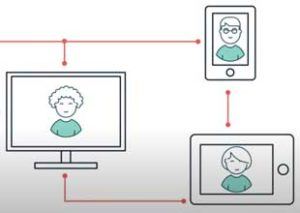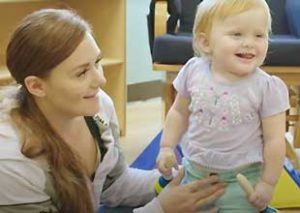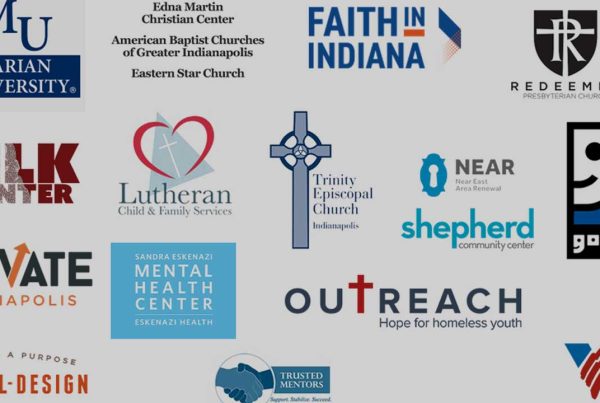 As we reflect on 2020, we recall the raw emotions so many felt and are still feeling. We saw people being confronted with hard truths about systemic racism and how it shows up in our society. We witnessed loss and broken dreams. However, we also saw individuals and organizations in our city responding to these times with empathy, innovation, and action. In order to celebrate the ways organizations, congregations and business have adapted during the pandemic and supported our most vulnerable, we are sharing here stories of organizations that are reaching across boundaries and embracing technology to connect with those in need. After this year, we hope you are more resolved than ever to engage and consider: How can you help your neighbors flourish? Regardless of the position you hold or your role in the community, how are you going to use your power and influence to implement lasting solutions for those confronting poverty? How will you be a part of the end of poverty in our community? In other words, how will you answer the call? We hope that you are blessed as you consider this question and that the holidays bring you and yours safety, good health, peace, and joy.
As we reflect on 2020, we recall the raw emotions so many felt and are still feeling. We saw people being confronted with hard truths about systemic racism and how it shows up in our society. We witnessed loss and broken dreams. However, we also saw individuals and organizations in our city responding to these times with empathy, innovation, and action. In order to celebrate the ways organizations, congregations and business have adapted during the pandemic and supported our most vulnerable, we are sharing here stories of organizations that are reaching across boundaries and embracing technology to connect with those in need. After this year, we hope you are more resolved than ever to engage and consider: How can you help your neighbors flourish? Regardless of the position you hold or your role in the community, how are you going to use your power and influence to implement lasting solutions for those confronting poverty? How will you be a part of the end of poverty in our community? In other words, how will you answer the call? We hope that you are blessed as you consider this question and that the holidays bring you and yours safety, good health, peace, and joy.
Emergency Grants Deliver Impact
Nonprofit and faith organizations seeking to serve and equip neighbors found their constituents facing new and additional challenges in 2020 as a result of COVID-19. To respond to these challenges – which ranged from the obvious health threats and dangers of isolation to increased anxiety, lack of access to basic resources, fear of housing loss, and more – many organizations quickly pivoted from a focus on long-term solutions to meet immediate needs. To assist in the essential shift, Christian Theological Seminary’s Faith & Action Project provided $75,000 in emergency relief grants, dividing the funds among seven organizations whose poverty mitigation work includes mental health services and family stability measures. Following are the organizations that received grants and a summary of how they used them.
 Eastern Star Church ROCK, $10,000. Eastern Star focused in two key areas with its grant: food access and mental-health support. Funds were used to strengthen the ROCK Fresh Market food program with an improved floorplan, expanded inventory, reliable supply chain, weekend hours, new partnerships, and expanded marketing. In addition, Eastern Star used funds to purchase software that allowed its prayer ministry to respond to live prayer requests for a five-hour period during Sunday worship service broadcasts on the first and third weeks of each month. This not only supported prayer activities but also provided for real-time stress relief for the congregation. The grant also allowed Eastern Star to leverage relationships with licensed mental health therapists to offer tele-health counseling services.
Eastern Star Church ROCK, $10,000. Eastern Star focused in two key areas with its grant: food access and mental-health support. Funds were used to strengthen the ROCK Fresh Market food program with an improved floorplan, expanded inventory, reliable supply chain, weekend hours, new partnerships, and expanded marketing. In addition, Eastern Star used funds to purchase software that allowed its prayer ministry to respond to live prayer requests for a five-hour period during Sunday worship service broadcasts on the first and third weeks of each month. This not only supported prayer activities but also provided for real-time stress relief for the congregation. The grant also allowed Eastern Star to leverage relationships with licensed mental health therapists to offer tele-health counseling services.- Edna Martin Christian Center, $10,000. The Edna Martin Christian Center (EMCC) utilized a little more than $3,000 of the Faith & Action Emergency grant for personal protective equipment and for cleaning and fogging its facility in order to operate more safely. The organization used the remaining $7,000 to provide direct financial assistance to families, helping people stay in their homes and apartments and pay for utilities, transportation, and other basic needs. To date, EMCC has distributed more than $2.7 million in emergency assistance and more than 150,000 pounds of food. The organization also adapted pantry operations to a drive-up format that eliminated anyone other than staff entering the building. In addition, it’s Senior Angels staff began making weekly “wellness check” phone calls to seniors.
 Julian Center, $10,000. The Julian Center used funds from the Emergency Relief Grant to access and utilize a secure video-conferencing portal to continue to provide therapy services to domestic violence survivors, and to purchase activities for survivors to use during shelter-in-place orders. Finally, the organization was able to provide incentives to staff who stayed on the front lines as essential workers during the shelter-in-place orders. The result? The funding helped to make a stressful time more peaceful and ensured that survivors were receiving services in a time when they were needed most.
Julian Center, $10,000. The Julian Center used funds from the Emergency Relief Grant to access and utilize a secure video-conferencing portal to continue to provide therapy services to domestic violence survivors, and to purchase activities for survivors to use during shelter-in-place orders. Finally, the organization was able to provide incentives to staff who stayed on the front lines as essential workers during the shelter-in-place orders. The result? The funding helped to make a stressful time more peaceful and ensured that survivors were receiving services in a time when they were needed most.- MLK Center, $10,000. MLK Center used the funds to transition their mental health services to remote application immediately when schools closed in March. They set up a phone line for neighbors to call the MLK Center and get directly connected to our counselor to then get a remote zoom session scheduled. The opportunity for remote mental health services was included in all of MLK’s media during in the spring, and as a result they saw an increase of 40% in the number of counseling requests. Due to the CTS funds, they will able to add an additional counselor to respond to the increased need. Additionally, MLK’s second parent support group during the pandemic – an 8-week counseling group for parents facilitated by students from Christian Theological Seminary, has continued. Finally, MLK used the funds to distribute financial assistance to families for rent and utilities.
 Sandra Eskenazi Mental Health Center at Eskenazi Health, $15,000. The Sandra Eskenazi Mental Health Center used grant funding in part to purchase Microsoft Surface Pros to help staff connect via telehealth with patients who could not travel or needed to be isolated. For times when telehealth is not an option, the Center created the Mobile COVID Response Team that can go to patients to provide face-to-face care, physical examinations, injections, and more. It also established the Safe Recovery Site, which offers a place to recover and heal for people who have been infected with COVID-19 and are experiencing homelessness. Visitors to the center receive care, food, and mental health services in partnership with the Family and Social Services Administration’s Division of Mental Health and Addiction.
Sandra Eskenazi Mental Health Center at Eskenazi Health, $15,000. The Sandra Eskenazi Mental Health Center used grant funding in part to purchase Microsoft Surface Pros to help staff connect via telehealth with patients who could not travel or needed to be isolated. For times when telehealth is not an option, the Center created the Mobile COVID Response Team that can go to patients to provide face-to-face care, physical examinations, injections, and more. It also established the Safe Recovery Site, which offers a place to recover and heal for people who have been infected with COVID-19 and are experiencing homelessness. Visitors to the center receive care, food, and mental health services in partnership with the Family and Social Services Administration’s Division of Mental Health and Addiction.- Shepherd Community Center, $10,000. Usually focusing 80% of its programming on long-term rehabilitation and redevelopment, Shepherd Community Center pivoted to putting 80% of its attention on immediate needs in the areas of food, education, connection, and family stabilization/employment. In addition to serving more than 129,000 individual meals to neighbors during the first six months of the pandemic, Shepherd provided its Shepherd Academy students with tablets (K-2nd grade) and laptops (3rd-5th grade) to support e-learning. For those who did not have home internet service, Shepherd partnered with Charter Communications to provide free internet service. Shepherd called neighbors active in its programs twice a week to track family needs, ensure families had enough food and to address spiritual needs, general needs and questions.
 Volunteers of America, $10,000. Funds from the Faith & Action Emergency Grant helped Volunteers of America pivot to a telehealth model for case management and counseling services after the pandemic hit. This has been imperative since social distancing requirements put severe limitations on clients’ much-needed social interactions. Group therapy sizes were condensed to a limited number of clients at one time, client visitation and in-person volunteer events were suspended indefinitely, and VOA could no longer transport clients to visits with other community service providers. All of this created further isolation for clients for whom support systems and familial connections are essential. The telehealth option has helped community volunteers and staff rally around clients with virtual messages of hope, greeting cards that help clients keep in touch with loved ones, and “how-to” videos that keep clients entertained.
Volunteers of America, $10,000. Funds from the Faith & Action Emergency Grant helped Volunteers of America pivot to a telehealth model for case management and counseling services after the pandemic hit. This has been imperative since social distancing requirements put severe limitations on clients’ much-needed social interactions. Group therapy sizes were condensed to a limited number of clients at one time, client visitation and in-person volunteer events were suspended indefinitely, and VOA could no longer transport clients to visits with other community service providers. All of this created further isolation for clients for whom support systems and familial connections are essential. The telehealth option has helped community volunteers and staff rally around clients with virtual messages of hope, greeting cards that help clients keep in touch with loved ones, and “how-to” videos that keep clients entertained.
Mark your calendar
April 15, 2021: Faith & Action Spring Conference
October 5, 2021: Faith & Action Fall Event





